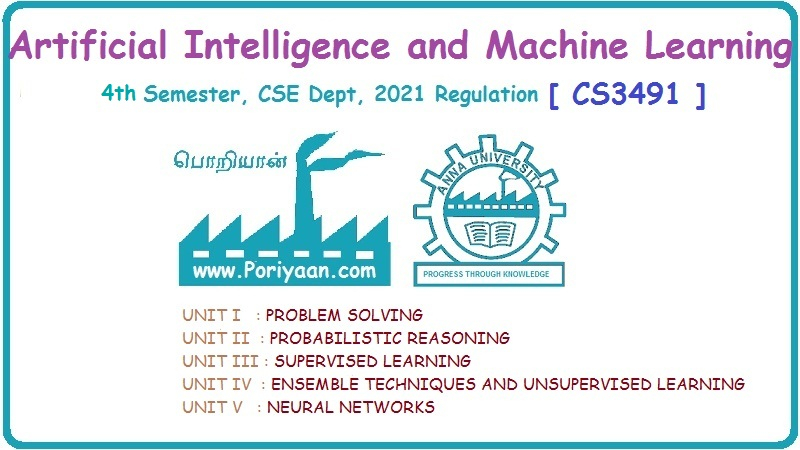Artificial Intelligence and Machine Learning: Unit I(a): Introduction to AI
AI Problem
Introduction to AI - Artificial Intelligence and Machine Learning
Much of the early working AI focused on formal tasks, such as game playing and theorem proving. For example chess playing, logic theorist was an early attempt to prove mathematical theorems.
Al
Problem
Much
of the early working AI focused on formal tasks, such as game playing and
theorem proving. For example chess playing, logic theorist was an early attempt
to prove mathematical theorems. Game playing and theorem proving share the
property that people who do them well are considered to be displaying
intelligence.
Despite
this it appeared that computers could perform well at those tasks by being fast
at exploring a large number of solution paths and then selecting the best one.
But no computer is fast enough to overcome the combinatorial explosion
generated by most problems.
AI
focusing on the sort of problem solving we do every day for instance, when we
decide to get to work in the morning, often called commonsense reasoning. In
investigating this sort of reasoning Newell, Shaw, and Simon built the General
Problem Solver (GPS), which they applied to several commonsense tasks as well
performing symbolic manipulations of logical expression. However no attempt was
made to create a program with a large amount of knowledge about a particular
problem domain. Only quite simple tasks were selected.
As
AI research progressed and techniques for handling larger amounts of world
knowledge were developed in dealing with problem solving in specialized domains
such as medical diagnosis and chemical analysis.
Perception
(vision and speech) is another area for AI problems. Natural language
understanding and problem solving in specialized domain are other areas related
to AI problems. The problem of understanding spoken language is perceptual
problem and is hard to solve from the fact that it is more analog related than
digital related. Many people can perform one or may be more specialized tasks
in which carefully, acquired expertise is necessary. Examples of such as tasks
include engineering design, scientific discovery, medical diagnosis, and
financial planning. Programs that can solve problems in these domains also fall
under the aegis of Artificial Intelligence.
The
tasks that are targets of works in AI can be categorized as follows:
1.
Mundane tasks - Perception (Vision and
Speech), Natural language
(Understanding,
Generation, Translation, Commonsense reasoning, Robot control)
2.
Formal tasks - Games (Chess, etc.),
Mathematics (Geometry, Logic, Integral calculus, etc.)
3.
Expert tasks - Engineering (Design, Fault
finding, Manufacturing planning), Scientific analysis, Medical diagnosis,
Financial analysis
A
person who knows how to perform tasks from several of the categories shown in
above list learn the necessary skills in a standard order. First perceptual,
linguistic, and commonsense skills are learned. Later expert skills such as
engineering, medicine, or finance are acquired. Earlier skills are easier and
thus more amenable to computerized duplication than the later, more specialized
one. For this reason much of the initial work in Al work was concentrated in
those early areas.
The
problems areas where now AI is flourishing most as a practical discipline are
primarily the domains that require only specialized expertise without the
assistance of commonsense knowledge. Expert systems (AI programs) now are up
for day-to-day tasks that aim at solving part, or perhaps all, of practical,
significant problem that previously required high human expertise.
When
one is building a expert system, following questions need to be considered
before one can progress further:
•
What are the underlying assumptions about
intelligence?
•
What kinds of techniques will be useful for solving
AI problems?
•
At what level if at all can human intelligence be
modelled?
•
When will it be realised when an intelligent program
has been built?
Artificial Intelligence and Machine Learning: Unit I(a): Introduction to AI : Tag: : Introduction to AI - Artificial Intelligence and Machine Learning - AI Problem
Related Topics
Related Subjects
Artificial Intelligence and Machine Learning
CS3491 4th Semester CSE/ECE Dept | 2021 Regulation | 4th Semester CSE/ECE Dept 2021 Regulation
